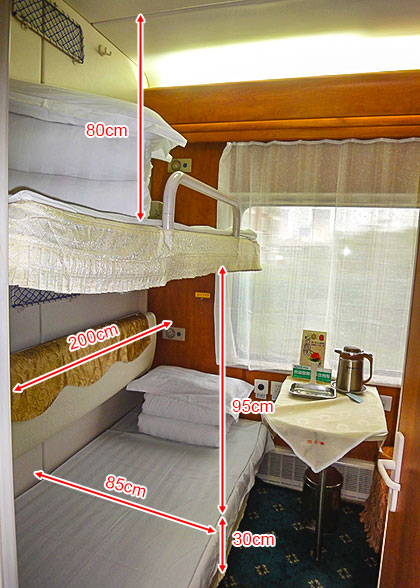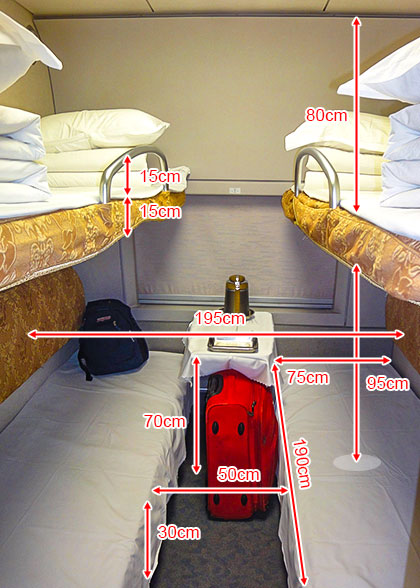In China, K, T, Z, L and some overnight D trains have soft sleeper class.
Soft Sleeper, as the name suggests, is softer than hard sleeper. But more importantly, the compartment is more spacious with only four berths inside, two upper and two lower; the berth is wider and longer, about 30 inches (75cm) and 75 inches (190cm) respectively; the compartment has a door, which separates it from the aisle and provides a quiet and private room for the passengers inside.
Soft sleeper ticket price is about 1.5 times of that of hard sleeper, and a lower berth costs more than an upper berth.
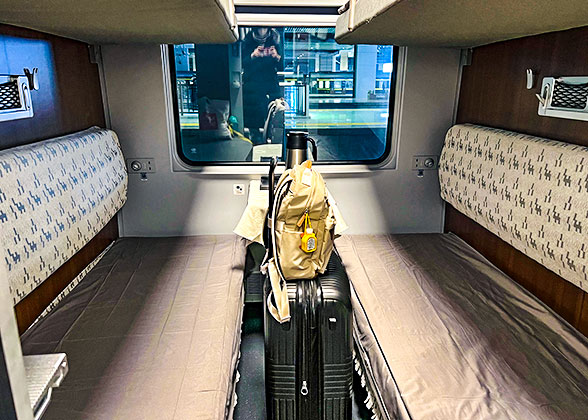 | | Interior of a Soft Sleeper Compartment | | 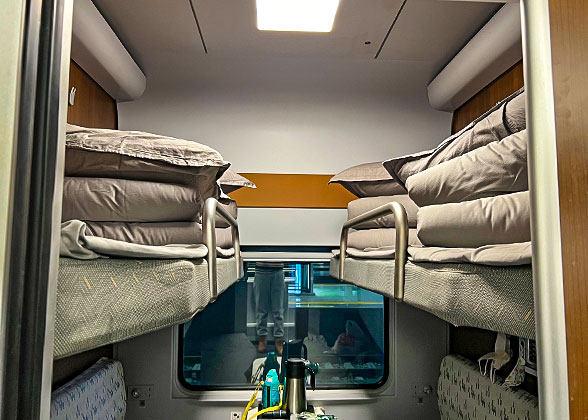 | | Each Comparment has 4 berths. | |
Soft sleeper China train carriage has a luggage closet above the door in each compartment. The luggage rack inside the compartment is about 16 inches (40cm) high and 20 inches (50cm) wide, just big enough for a 20-inch suitcase. The larger luggage can be put under the lower berth or the table between the two lower berths.
Quality quilt, pillow, and sheet are provided. Each bunk has a reading lamp. Some trains also have an LCD TV screen and a headphone for each soft sleeper bunk. Radio and temperature controls are alongside the door.
What’s more, on a small table between the two lower bunks, there is a tray for litter and a thermos. On some routes, you may also find a plug under the table for your laptop and mobile phone. Disposable slippers are also provided for passengers.
Foldable seats are also available by the windows in the aisle.
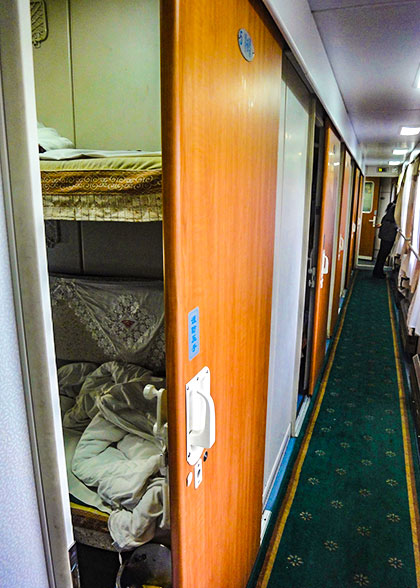 | Each compartment has a door
to be seperated with aisle. | | |
A soft sleeper train carriage in China has 9 compartments. With four bunks inside each, soft sleeper beds inside a carriage are numbered from 1 to 36. The even numbers are the upper bunks while the odd numbers are the lower bunks. If you travel with friends, remember to tell the conductor that you wish to stay in the same compartment. As in other carriage types, the dustbin, toilet, smoking area, wash-basins, mirror, drinkable water heater and fire extinguisher are at the end of the carriage. However, a D train (bullet type) does not have a smoking area, as it is not allowed to smoke on it, not even in toilet. Some trains (like D ones) has the seat type toilet and also provides toilet paper, but this is not universal and soft sleeper carriages in most trains still use the squat type toilet without toilet paper.
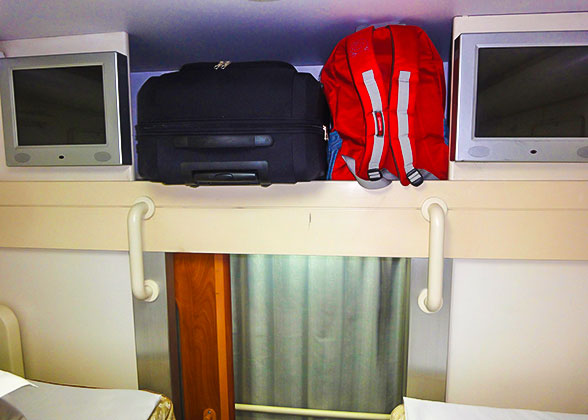 | | Luggage Closet | | | 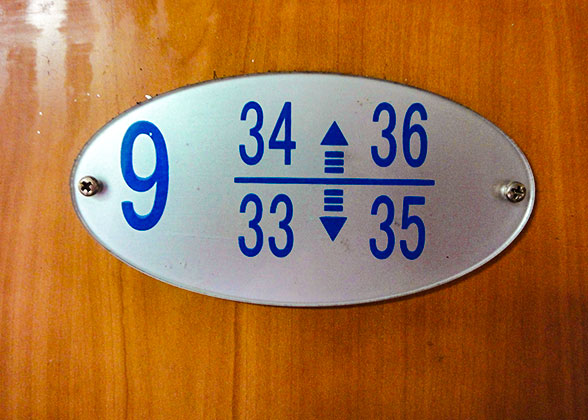 | | The Numbers of Bunks in A Compartment | |
| Soft Sleeper | Hard Sleeper |
| Private compartments with lockable doors; recommended for passengers who have difficulty in sleeping | Open compartments without doors; less privacy |
| 4 berths in a compartment; the beds are wider, longer, and more comfortable, suitable for larger passengers | 6 berths in each compartment; the beds are short and narrow |
| All passengers can sit up on their berths | Passengers in the middle or upper berths cannot sit straight |
| Luggage closet above the door inside the compartment | Luggage rack above the aisle outside the compartment |
| Both western style and squat toilets | Squat type toilets |
| More facilities, including reading lights, coat hangers, and controller for air-conditioner, broadcasting volume, and light | Only basic facilities like bedding, a tray for litter and a thermos |
| One socket in each compartment | A few sockets in each carriage |
| 50% more expensive than a hard sleeper berth | Cheapest among all sleepers |
 See detailed introduction on Hard Sleeper
See detailed introduction on Hard Sleeper
Deluxe soft sleepers also appear on K, T, Z, L and some overnight D trains. Each carriage has 8 – 10 lockable compartments. Each compartment has an upper and a lower bed in one side, with quality beddings. In the other side of the deluxe soft sleeper carriage, there is a comfortable sofa, a closet, and a private toilet equipped with wash-basin, seat-type toilet, and toilet paper. Some even have showers in the toilet. Facilities such as thermos, tray for litter, rubbish bin, LCD TV, headphone, temperature control, reading lamp, and slippers are available.
It is currently only available on the overnight high speed trains D311 and D312 between Beijing and Shanghai. It is totally different from the traditional sleepers. Two-deck sleepers are set up on both sides of each carriage according to the train’s travel direction, with the aisle in the middle. Each sleeper is equipped with independent desk, socket, coat rack and lamp. A curtain is also provided to protect passenger’s privacy. To make passengers feel more comfortable, the new sleeper increases the height between the upper berth and the ceiling, so upper-berth passenger can sit up. An adjustable backrest on the wall also helps passengers sit comfortably. Under the lower berth, passengers can store their luggage.
Tips
1. The compartments in soft sleeper or deluxe soft sleeper carriages are lockable, so passengers actually share a small room with others. If you feel uncomfortable to be in a room with passengers of the opposite sex, especially during an overnight trip, you can try to ask the conductor arrange an all-female or all-male compartment for you when you buy the ticket at the railway station or ticket window (bunks can not be chosen when booking online or through telephone).
2. For foreign passengers wishing to have a good rest during the trip, we recommend soft sleeper or deluxe soft sleeper rather than hard sleeper. The compartment provides more room for you to move around and also gives some privacy.
3. The sleeper carriages in
international trains running between China and neighbouring countries may be different.

More China Train and Ticket Types:
- Last updated on Oct. 09, 2024 by Brenda Lian -
![]() See detailed introduction on Hard Sleeper
See detailed introduction on Hard Sleeper